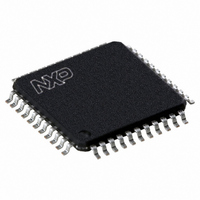P89LV51RD2BBC,557 NXP Semiconductors, P89LV51RD2BBC,557 Datasheet - Page 47

P89LV51RD2BBC,557
Manufacturer Part Number
P89LV51RD2BBC,557
Description
IC 80C51 MCU FLASH 64K 44-TQFP
Manufacturer
NXP Semiconductors
Series
89LVr
Datasheet
1.P89LV51RD2BBC557.pdf
(76 pages)
Specifications of P89LV51RD2BBC,557
Program Memory Type
FLASH
Program Memory Size
64KB (64K x 8)
Package / Case
44-TQFP, 44-VQFP
Core Processor
8051
Core Size
8-Bit
Speed
33MHz
Connectivity
SPI, UART/USART
Peripherals
Brown-out Detect/Reset, POR, PWM, WDT
Number Of I /o
32
Ram Size
1K x 8
Voltage - Supply (vcc/vdd)
2.7 V ~ 3.6 V
Oscillator Type
Internal
Operating Temperature
0°C ~ 70°C
Processor Series
P89LV5x
Core
80C51
Data Bus Width
8 bit
Data Ram Size
1 KB
Interface Type
SPI/UART
Maximum Clock Frequency
40 MHz
Number Of Programmable I/os
32
Number Of Timers
3
Operating Supply Voltage
2.7 V to 3.6 V
Maximum Operating Temperature
+ 70 C
Mounting Style
SMD/SMT
3rd Party Development Tools
PK51, CA51, A51, ULINK2
Minimum Operating Temperature
0 C
Cpu Family
89LV
Device Core
80C51
Device Core Size
8b
Frequency (max)
40MHz
Total Internal Ram Size
1KB
# I/os (max)
32
Number Of Timers - General Purpose
3
Operating Supply Voltage (typ)
3.3V
Operating Supply Voltage (max)
3.6V
Operating Supply Voltage (min)
2.7V
Instruction Set Architecture
CISC
Operating Temp Range
0C to 70C
Operating Temperature Classification
Commercial
Mounting
Surface Mount
Pin Count
44
Package Type
TQFP
Lead Free Status / RoHS Status
Lead free / RoHS Compliant
For Use With
622-1017 - BOARD 44-ZIF PLCC SOCKET622-1008 - BOARD FOR LPC9103 10-HVSON622-1001 - USB IN-CIRCUIT PROG 80C51ISP
Eeprom Size
-
Data Converters
-
Lead Free Status / Rohs Status
Lead free / RoHS Compliant
Other names
568-1289
935274177557
P89LV51RD2BBC
935274177557
P89LV51RD2BBC
Available stocks
Company
Part Number
Manufacturer
Quantity
Price
Company:
Part Number:
P89LV51RD2BBC,557
Manufacturer:
NXP Semiconductors
Quantity:
10 000
NXP Semiconductors
P89LV51RB2_RC2_RD2_5
Product data sheet
In the CMOD SFR there are three additional bits associated with the PCA. They are CIDL
which allows the PCA to stop during Idle mode, WDTE which enables or disables the
Watchdog function on module 4, and ECF which when set causes an interrupt and the
PCA overflow flag CF (in the CCON SFR) to be set when the PCA timer overflows.
The watchdog timer function is implemented in module 4 of PCA.
The CCON SFR contains the run control bit (CR) for the PCA and the flags for the PCA
timer (CF) and each module (CCF4:0). To run the PCA the CR bit (CCON.6) must be set
by software. The PCA is shut off by clearing this bit. The CF bit (CCON.7) is set when the
PCA counter overflows and an interrupt will be generated if the ECF bit in the CMOD
register is set. The CF bit can only be cleared by software. Bits 0 through 4 of the CCON
register are the flags for the modules (bit 0 for module 0, bit 1 for module 1, etc.) and are
set by hardware when either a match or a capture occurs. These flags can only be cleared
by software. All the modules share one interrupt vector. The PCA interrupt system is
shown in
Each module in the PCA has a special function register associated with it. These registers
are: CCAPM0 for module 0, CCAPM1 for module 1, etc. The registers contain the bits that
control the mode that each module operates in.
The ECCFn bit (from CCAPMn.0 where n = 0, 1, 2, 3, or 4 depending on the module)
enables the CCFn flag in the CCON SFR to generate an interrupt when a match or
compare occurs in the associated module (see
PWM (CCAPMn.1) enables the pulse width modulation mode.
The TOGn bit (CCAPMn.2) when set causes the CEX output associated with the module
to toggle when there is a match between the PCA counter and the module’s
capture/compare register.
The match bit MATn (CCAPMn.3) when set will cause the CCFn bit in the CCON register
to be set when there is a match between the PCA counter and the module’s
capture/compare register.
The next two bits CAPNn (CCAPMn.4) and CAPPn (CCAPMn.5) determine the edge that
a capture input will be active on. The CAPN bit enables the negative edge, and the
CAPPn bit enables the positive edge. If both bits are set, both edges will be enabled and a
capture will occur for either transition.
The last bit in the register ECOMn (CCAPMn.6) when set enables the comparator
function.
There are two additional registers associated with each of the PCA modules. They are
CCAPnH and CCAPnL and these are the registers that store the 16-bit count when a
capture occurs or a compare should occur. When a module is used in the PWM mode
these registers are used to control the duty cycle of the output.
Figure
21.
Rev. 05 — 15 December 2009
P89LV51RB2/RC2/RD2
Figure
8-bit microcontrollers with 80C51 core
21).
© NXP B.V. 2009. All rights reserved.
47 of 76
















